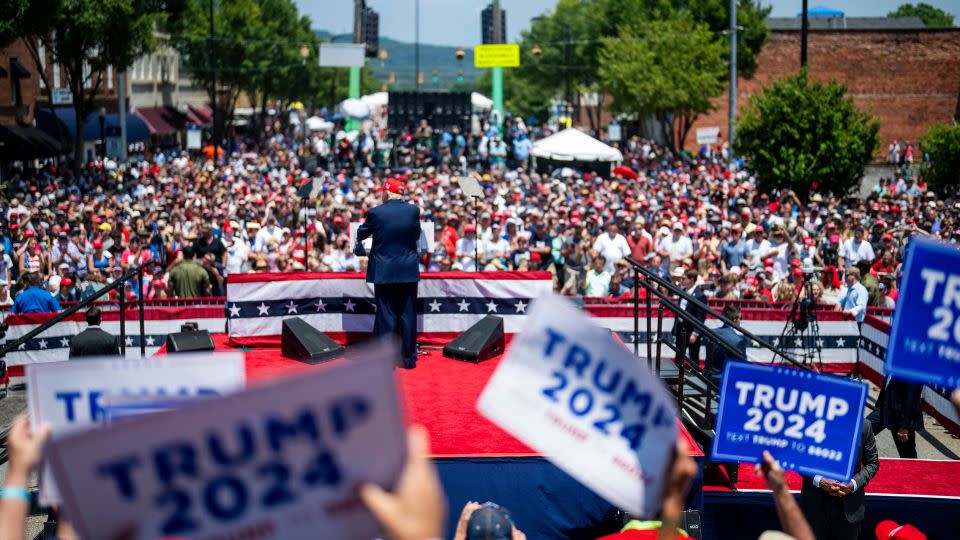These Americans are ambivalent about democracy

A version of this story appeared in CNN’s What Matters newsletter. To get it in your inbox, sign up for free here.
A new CNN poll in the key early primary state of South Carolina confirms the findings in recent polls from other early primary states: Former President Donald Trump is the prohibitive leader in the Republican primary and there is no consensus alternative.
Trump has the support of 53% of likely voters in the South Carolina Republican primary, and his support is also more committed behind him than those supporting his Republican opponents.
For a candidate like Sen. Tim Scott, who does not even get to 10% support among likely Republican primary voters in his home state, one wonders how he can see a way to the top.
But it is a different question in the polling results that really caught my eye.
Is subverting an election relevant to being president?
In the CNN poll conducted by SSRS, we asked likely South Carolina voters this:
A full two-thirds, 67%, of all likely Republican primary voters in South Carolina said Trump’s efforts to overturn the election, if true, are not relevant to his fitness for the presidency.
The figure pops up to 92% of the voters who currently back Trump. That’s the vast majority of Trump supporters, at least in South Carolina at this moment.
Ambivalence about democracy
It is possible that among these particular primary voters in South Carolina, they are unwilling or incapable of entertaining a key part of the question – the stipulation that Trump’s efforts to overturn the 2020 election is true.
A national poll conducted for CNN by SSRS and released in September generated generally similar results.
The ultimate implication is that Trump’s supporters don’t necessarily care if he tried to subvert the election and are, at best, ambivalent about the idea of democracy.
2 wolves vs. 1 sheep
With that in mind, take a look at this quote from the new House speaker, Rep. Mike Johnson – which the New Republic pulled from a sermon he gave at the First Baptist Church of Haughton, Louisiana, in 2019 – in which he argued for a sort of “biblically sanctioned government,” one aspect of which is civil government, along with the family and the church. God-fearing people, he said, should fear democracy.
“By the way, the United States is not a democracy. Do you know what a democracy is? Two wolves and a sheep deciding what’s for dinner. You don’t want to be in a democracy. Majority rule: not always a good thing,” he said, adding he thinks the nation’s founders were “divinely inspired to set up a different thing.”
It’s an interesting lecture because it shows Johnson’s worldview and his great concern that in the US, the civil government is too strong and “government is becoming God.”
Fearing the majority
Underneath Johnson’s comment about democracy is a fear of the majority. He seems to be suggesting that good people, like him, who don’t want to live under such circumstances are the sheep and the masses are the wolves.
Making the point that the US is not technically a democracy has been swirling around among Republicans for years. Back in 2020, frustrated at being isolated in the relatively early days of the Covid-19 pandemic, Sen. Mike Lee of Utah said something similar to Johnson on the social media platform then known as Twitter.
“Democracy isn’t the objective; liberty, peace, and prospefity (sic) are. We want the human condition to flourish. Rank democracy can thwart that,” Lee wrote.
Lee and Johnson, although they don’t want to talk about it now, were among the lawmakers on Capitol Hill actively trying to help Trump overturn the election before January 6, 2021.
Should a leader break the rules?
Another poll out last week plays into all of this. PRRI’s 2023 American Values Survey asked Americans if they agreed that things in the country had gotten so off track that “we need a leader who is willing to break some rules if that’s what it takes to set things right.”
Nearly half of Republicans, 48%, agreed with the idea, which is a foundation of authoritarianism, compared with 38% of independents and 29% of Democrats.
That survey also asked if because things have gotten so far off track, “true American patriots may have to resort to violence in order to save our country.”
A third of Republicans agreed with that statement, compared with 22% of independents and 13% of Democrats.
Now apply this mindset to the next presidential election, in 2024, when it may very well be a rematch of Trump against Joe Biden. For some Americans, the end goal of participating in the election is to get their candidate elected, while for others, democracy is less of a concern.
For more CNN news and newsletters create an account at CNN.com


